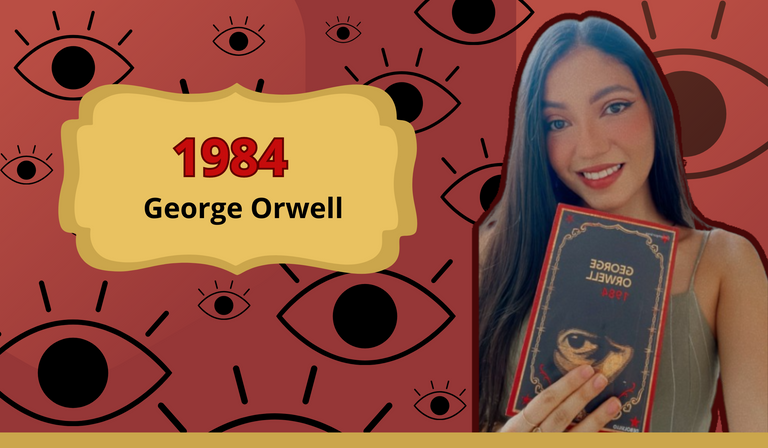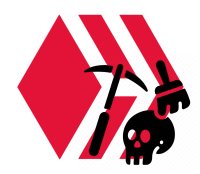I never imagined living inside a book 👁 - 1984 GEORGE ORWELL

1984 is considered one of the greatest works of the last century and one of the author's best works. The book touches extensively on the political theme being a criticism against the totalitarian governments of the time (whose practices are still present in some countries, including my own). It is also considered as a warning to the population of the consequences of allowing absolute state control such as the loss of rights, individuality and freedom.
The book tells us from the point of view of its protagonist, Winston Smith, who works for the Ministry of Truth which is in charge of government propaganda encompassing news, education and entertainment. Winston's job is to rewrite the facts according to the interests of the party. The book shows us an increasing development of the character, passing through different stages from a passive and conformist one to a very conscious and resistive one.
It is one of the greatest socio-political works ever written and if you don't have the opportunity to read it I recommend you do so. I will talk about my experience as a reader, this was a book that I identified with in every chapter.
This review has spoilers so read at your own discretion.

As a young Venezuelan, it was inevitable for me to feel empathy towards the protagonist and towards the people who are subjected by the party and its main figure: "The big brother", since as long as I can remember, I have lived under the mandate of the same political party and the only time there was a change of president was because he died. Just as the party imposes on the inhabitants of Oceania the figure of the elder brother as hero and savior of the superstate, the Venezuelan government imposes the figure of the "supreme and eternal Commander" as hero and savior from the "claws of capitalism" and "North American imperialism".
Obviously, there are many differences between the situation presented in the book with the current Venezuelan situation, each case has its peculiarities and specific contexts, however, despite all these differences, there is also a point where both achieve some similarity where a person like me who has** seen his family migrate for a better future**, who has lived through protests and unpunished deaths, who has seen arbitrary imprisonments and lives in an environment of injustice and corruption, it is very easy to relate each situation that the author narrates under the perspective of Winston Smith and compare it with the harsh reality.
Like Winston, all Venezuelans reached a point of rethinking reality. From the year 1999 to the year 2010 the panorama was getting worse, slowly but progressively, the arbitrary discourse no longer coincided with what was really happening in the streets, from 2013 to the present the situation has been a complete nightmare for those of us who today live under the clutches of the regime, especially for young people with a desire to better themselves. Something similar happens in the book: every home belonging to the Oceania superstate has installed a surveillance and transmission device called "telescreen". In these they gave the news of the day with propaganda concerning the party and, likewise, they watched the 13% of the population (the other percentage were the proles who were not considered a threat) who belonged and carried out the tasks in the ministries of the party:
- Ministry of Love: in charge of maintaining order through torture and brainwashing. It repressed rebellious citizens.
- Ministry of truth: In charge of government propaganda.
- Ministry of peace: In charge of perpetuating the "war" (supposed war between the 3 super states Oceania Eurasia and Asia).
- Ministry of Abundance: In charge of economic affairs.
By means of the telescreens, the party provided strategic information to maintain a certain mental domination. Every now and then a report of this kind would come out: "The Ministry of Abundance is proud to announce an increase in the weekly food ration. Thanks to the efficiency and planning of the Party, everyone will enjoy a balanced and healthy diet." "Chocolate is food for the brain, not for the body."
This type of campaign was intended to justify the inefficiency of the party in the face of the deplorable situation in which its inhabitants lived, where the blame was placed on the war between superstates, or they pretended to congratulate themselves for complying with something that as a government it is their obligation to provide. This typical movement of states with failed economies does not only occur in the book. In reality, the current president of the country interrupts national radio and television transmissions to give long speeches in which he and his party justify their bad management, and where there is always someone to blame.

Winston is described as an ordinary adult who works as one in the ministry of truth, editing past records (newspapers, books, articles), modifying them to match the party's current ideas by changing dates or deleting/adding people that are convenient at the time.
The only thing that keeps us connected to the past is history, which is based on records. If these disappear or are altered, the perspective of the past in the present is also altered, which makes the individual resort to memory. This being such a subjective and error-prone place, there is a risk that the past will be forgotten or altered, allowing for thought control and the perpetuation of an ideology.
Bringing this to reality is not so easy, since today every individual possesses a cell phone capable of capturing audio and video of every event. However, there is control over what is said, done, or written in the media, since they are censored by the state.
Throughout the previous decade, there have been multiple arrests of journalists, as well as closures of newspapers and television channels, just for openly expressing their dissatisfaction with the Venezuelan government. This is what totalitarian governments do: they shut down voices and censor freedom of thought.

The book touches on themes of rebellion and punishment. Winston Smith meets a young woman named Julia who, like him, feels a desire for freedom and repudiates the party. They start a love affair and have forbidden encounters because it is illegal and punished for two people to have sexual relations (even in marriages, since the task of marriages is the procreation of the new generation that will serve the party).
In the book, Julia and Winston build such an intimate relationship that they fantasize about freedom and a better life, to such an extent that they decide to join a group of supposed dissidents called the sisterhood.
Unfortunately, both are discovered and punished. Both are subjected to intense torture and mental manipulation in the ministry of love in order to re-educate them both to forget their individuality and their sense of freedom and flatter the older brother.
In reality, the Venezuelan population, dissatisfied with the situation, decided to take to the streets and protest to demand a better quality of life and respect for the laws established in the constitution. Just like the book this large crowd was and continues to be repressed through military forces and armed groups akin to the government.
Since 2014, this repression has left a toll of hundreds of dead (it is said that there were more, but the government is the one who publishes these figures)
Thousands of women and men imprisoned. Politicians subjected to tortures such as being locked in subway basements without sunlight and any kind of shelter, without the right to food for several days, electric shocks, beatings, detachment of nails, rapes and other acts that remain unpunished to this day.

Another important character is Mr. O'Brian who is a member of the inner party which is represented by 2% of the population of Oceania. Winston is duped and tricked by him who takes him to his house where he sees that he leads a different lifestyle than most citizens.
In O'Brien's house, Winston enters a room that has no microphones or telescreens, which represents a significant symbolic luxury since they live in a highly monitored society, this type of luxury granted to a minimum percentage of the population (in general, people belonging to the government or their relatives). This is also latent in reality, only that instead of privacy it is represented in the form of property, cars, jewelry and any existing material luxury. In addition, this small group of people has a privileged treatment by the authorities.
To conclude, I want to talk about how brainwashing works: in reality, although 90% of Venezuelans reject the current political party that runs the country, there is something in all of us who are still in Venezuela that has changed and that is very difficult to return to what it was before: the prospect of having a normal life.
For many people in my country, there are things so common in other parts of the world (like going for an ice cream or going out to dinner once in a while) that have become a complete luxury and they classify it as something that only people with money can do. Rendering food or personal hygiene products is not at all normal in a country with quality of life. Here it is common to break the bar of bath soap, to wait in line for hours and hours to get gas, to have power outages for long periods of time or to only have drinking water on certain days of the month or week.
The brainwashing works that way, getting people used to live their daily lives in these conditions and to resign themselves to live like this without protesting.
as a reflection I want to tell you that we are many Venezuelans who work hard every day, we study, we undertake to overcome the difficult situation in which the government of our country keeps us and despite all the adversities we never leave our sense of humor and good vibes and always keep a smile on our faces and help those who need it because we more than anyone know what it is like to need a helping hand.
Finally, I will make a checklist where I compare situations from the book with real life:
| Libro 1984 | Venezuela | ||
|---|---|---|---|
| ✅Power seized and maintained by police forces | ✅Power seized and maintained by police forces | ||
| ✅A single political party maintains control of the territory | ✅A single political party maintains control of the territory | ||
| ✅Political propaganda | ✅Political propaganda | ||
| ✅ Control of the economy and media | ✅Control of the economy and media | ||
| ✅Colors representing the party's presence (blue and white) | ✅Colors representing the party's presence (Red and white) |
Excellent comparative analysis of the reality lived in the book with the reality we live in the country. 1984 is a great work, because it exposes the tricks that totalitarianism uses to carry out its plans and, unfortunately, it shows us the reality that awaits many countries in the world as long as our right to privacy and to express ourselves continues to diminish until it disappears. Regards.
thank you friend! and appreciate your comment💞
This comment was made by a hive-archeology bot running under the control of @pibara

The goal of this comment is to act as reward proxy for up-voting valuable timeless content on HIVE for what the one-week upvote window has closed.
The bot script is currently pre-beta.